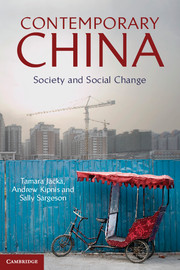Book contents
- Frontmatter
- Contents
- List of Images
- List of Maps
- List of Figures
- List of Tables
- Acknowledgments
- List of Abbreviations
- Map 0.1: China's provinces and provincial capitals
- Introduction
- Part 1 Social Institutions
- Part 2 Cultures, Socialization and the Formation of Identities
- 6 Religion, Ritual and Religiosity
- 7 Ethnicity
- 8 Education and the Cultivation of Citizens
- 9 Modernity, Youth Identities and Popular Culture
- Part 3 Inequalities, Injustices and Social Responses
- Glossary of Chinese Terms
- References
- Index
6 - Religion, Ritual and Religiosity
Published online by Cambridge University Press: 05 June 2014
- Frontmatter
- Contents
- List of Images
- List of Maps
- List of Figures
- List of Tables
- Acknowledgments
- List of Abbreviations
- Map 0.1: China's provinces and provincial capitals
- Introduction
- Part 1 Social Institutions
- Part 2 Cultures, Socialization and the Formation of Identities
- 6 Religion, Ritual and Religiosity
- 7 Ethnicity
- 8 Education and the Cultivation of Citizens
- 9 Modernity, Youth Identities and Popular Culture
- Part 3 Inequalities, Injustices and Social Responses
- Glossary of Chinese Terms
- References
- Index
Summary
In contemporary China, there are a huge variety of ideals, activities, people, practices, networks and buildings that could be depicted as either religious or quasi-religious. These include Christian churches, Islamic mosques, Buddhist, Daoist and local temples, ancestral shrines, fortune tellers, geomancers, qigong practitioners (those who manipulate qi, the vital energy of life), Confucian ritualists, teachers of Confucian, Daoist or Buddhist philosophy, and even the purveyors of state ideologies and rituals, who often draw on broadly religious sensibilities. To grasp this huge array of discourses, activities, people and things, we must begin by examining why some are classified as “religious” while others are not, and how Chinese historical experience has affected this classificatory logic.
Defining and regulating religious activity in China
In western countries, over the latter half of the second millennium, the category of religion took shape through the gradual emergence of secular modes of governing and scientific reasoning in societies that were formerly ruled in the name of Christianity. Because Christianity emphasized inner belief, and because the power of religious leaders was diminished by the separation of the church from both state rule and the scientific depiction of nature, the category of religion came to refer to relatively powerless institutions of belief, clearly separate from both government and science. Freedom of religion became a freedom of “belief” that was not to impinge on either state rule or scientific reason. Individuals or groups who wished to impose their religion on the state, or who ignored scientific findings because of their religious beliefs, were dismissed respectively as zealots or cults.
- Type
- Chapter
- Information
- Contemporary ChinaSociety and Social Change, pp. 127 - 144Publisher: Cambridge University PressPrint publication year: 2013



